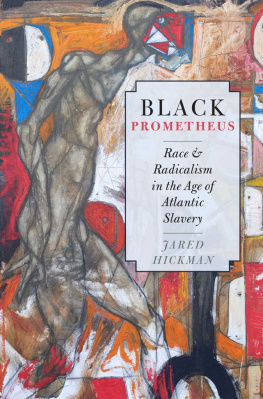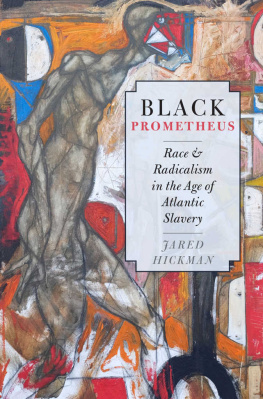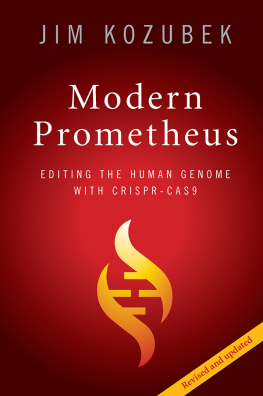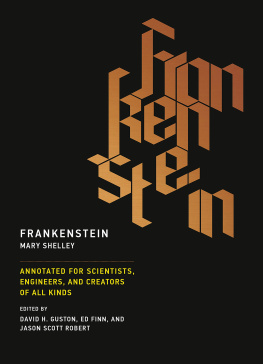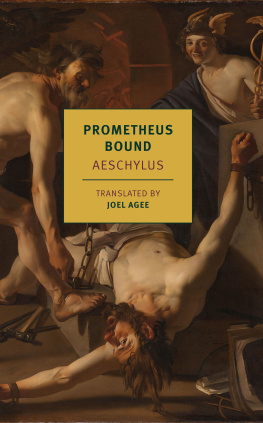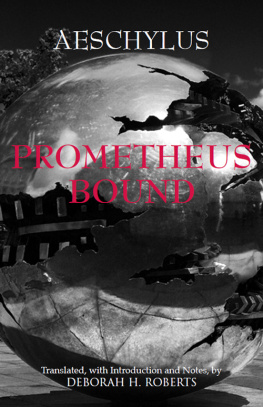Black Prometheus
Black Prometheus
RACE AND RADICALISM IN THE AGE OF ATLANTIC SLAVERY
Jared Hickman


Oxford University Press is a department of the University of Oxford. It furthers the Universitys objective of excellence in research, scholarship, and education by publishing worldwide. Oxford is a registered trade mark of Oxford University Press in the UK and certain other countries.
Published in the United States of America by Oxford University Press
198 Madison Avenue, New York, NY 10016, United States of America.
Jared Hickman 2017
All rights reserved. No part of this publication may be reproduced, stored in a retrieval system, or transmitted, in any form or by any means, without the prior permission in writing of Oxford University Press, or as expressly permitted by law, by license, or under terms agreed with the appropriate reproduction rights organization. Inquiries concerning reproduction outside the scope of the above should be sent to the Rights Department, Oxford University Press, at the address above.
You must not circulate this work in any other form and you must impose this same condition on any acquirer.
Library of Congress Cataloging-in-Publication Data
Names: Hickman, Jared.
Title: Black Prometheus : race and radicalism in the age of Atlantic slavery / Jared Hickman.
Description: New York : Oxford University Press, [2016]
Identifiers: LCCN 2015033375| ISBN 9780190272586 (cloth) | ISBN 9780190272593 (updf) | eISBN 9780190628666
Subjects: LCSH: Prometheus (Greek deity) | Prometheus (Greek deity)In literature. | Mythology, Greek, in literature. | Mythology, Classical, in literature. | SlaveryAtlantic Ocean RegionHistory.
Classification: LCC BL820.P68 H53 2016 | DDC 292.2/113dc23
LC record available at https://lccn.loc.gov/2015033375
For Aimee, who, with her own divine presence, set my world alight at a riverside bonfire so long ago
{ CONTENTS }
Given that inquiries often enter into a mimetic relation with their objects, the making of this book has, not surprisingly, been a torturous and at times seemingly interminable process. Without the support and stimulus of family, friends, colleagues, institutions, and the writers and scholars whose conversations I have been inspired to join in these pages, this book simply would not becertainly not its best bits.
In retrospect, a definitive point of origin for this project was a Wanderjahr in 2001-2002 through Europe and Latin America investigating popular religious traditions graciously funded by the Thomas J. Watson Foundation. That experience was the platform for graduate study in the Harvard English department, where my peers in the Americanist colloquium and advisers Vincent Brown, John Stauffer, and, above all, the inestimable Lawrence Buell, provided invaluable encouragement and feedback on the dissertation that formed the germ of this booka dissertation that could not have been completed without fellowships from the Harvard English department and the American Council of Learned Societies and Andrew J. Mellon Foundation and the reduced rent offered by our Somerville landlord, Andrew Upton, on condition that I acknowledge him here. The years since in the Johns Hopkins English department have been nothing short of an intellectual exhilaration whence much of this books merit, such as it is, derives. For your brilliant minds, instructive examples, and sustaining efforts on my behalf, thank you Sharon Achinstein, Amanda Anderson, Sharon Cameron, Drew Daniel, Simon During, Mary Favret, Frances Ferguson, Richard Halpern, Jeanne-Marie Jackson, Jonathan Kramnick, Linda Liu, Doug Mao, Andrew Miller, Will Miller, Roger Maioli, Chris Nealon, Jesse Rosenthal, Grant Shreve, Eric Sundquist, Mark Thompson, and Doug Tye. So many colleagues have enriched this book through their acute commentary, revelatory conversation, and convivial pick-me-upsto name but a few who intervened at especially crucial junctures: Stephen Best, Sam Brown, Pete Coviello, Liz Fenton, Toni Wall Jaudon, Vincent Lloyd, Sam Otter, Martha Schoolman, Jordan Stein, Elisa Tamarkin, and Bryan Wagner. Id also like to thank all those who have engaged so helpfully when Ive presented work pertaining to this book at various conferences and departmental events at UC-Berkeley, Harvard, NYU, and Syracuse. Gratitude as well to two groups of people at opposite ends of this books productionthe staffs of Harvard University Libraries, the Schomburg Center for Research in Black Culture, the British Library, and the School of Oriental and African Studies, who helped supply some of the stuff about which I have much to say in this book, and Brendan ONeill the Oxford University Press readers of my manuscript, who helped me say what I wanted to say so much more clearly.
Finally, thanks be to precious family who have contributed to the making of this book and the animating life around it: my parents-in-law, Russ and Sharron Evans, for taking me in and bearing me up in ways I never could have anticipated (and for having the excellent taste to acquire the stunning Sheldon Harvey painting that adorns the cover); my brothers- and sisters-in-law, Mike Kelly, Jeremy Moss, Alissa and Jon King, and Lorraine and Dan Jackson, for gracing me with your many gifts and good humor; my sisters Kim Kelly and Leigh Moss for being two of the coolest people I know and most want to hang out with at any given moment; my parents, Craig Hickman and Pamela Mitchell, for a lifetime of heartening and empowering attention and care without which I no doubt would be a useless lump; and my own little family: Sylvia Pearl, the little girl the universe knew I needed to nestle into those as-yet-untouched corners of my heart; Ezekiel Friend, precocious young scholar and prankster who reminded me again and again that Id been working on this book for literally his entire life (no doubt your books wont take nearly as long); Leonidas Russell, my eldest and one of the simultaneously brainiest and gentlest people I know; and, above all, the wife of my youth, Aimee Elizabeth Dale Evans, who knows better than anyone the soul thats gone into this book, because she is that souls matewink, blink, wink.
Portions of have previously appeared primarily as Globalization and the Gods, or the Political Theology of Race, Early American Literature 45, no. 1 (March 2010): 145-82, but also in Cosmic American Studies, PMLA 128, no. 4 (2013): 968-75; The Recanonization of Saint Cyprian: A Deep History of Black Religion and Racialism, in The Racial Saint: Marked Flesh, Holy Flesh, ed. Vincent Lloyd and Mollye Harbour Bassett (New York: Routledge, 2014); and (with Peter Coviello) Introduction: After the Postsecular, American Literature 86, no. 4 (December 2014): 645-54. Much of chapter 3 was published as Douglass Unbound, Nineteenth-Century Literature 68, no. 3 (December 2013): 323-62, but additional portions are also drawn from the aforementioned Globalization and the Gods essay.
Black Prometheus
The news here is not that the Prometheus myth persists into modernity, as so many ancient myths do (the notion of a triumphant victory of Moderns over Ancients is of course a tenet of modernist ideology rather than a fact of modern history). Rather, the question is under what conditions and with what implications this particular ancient myth has come to serve as something like a myth of modernity itself.

